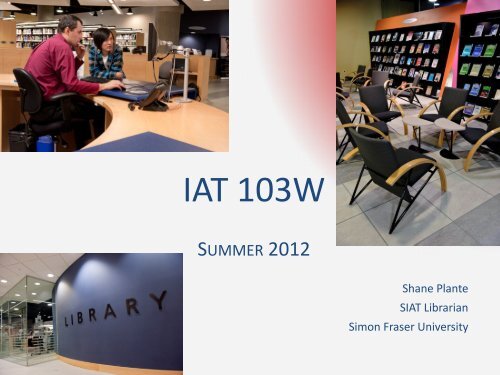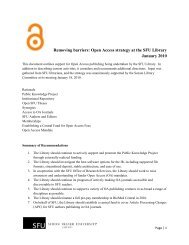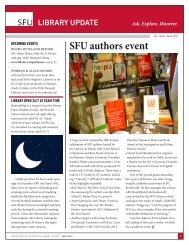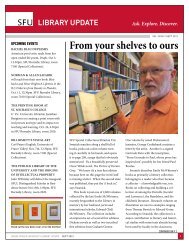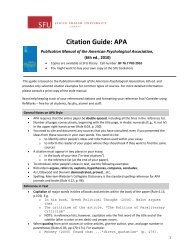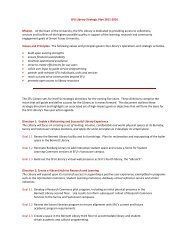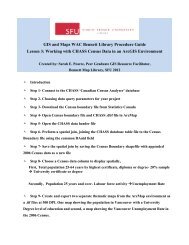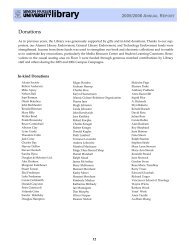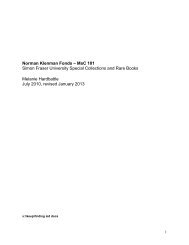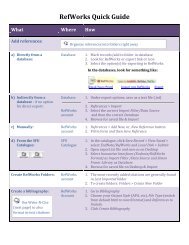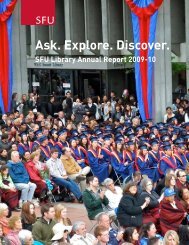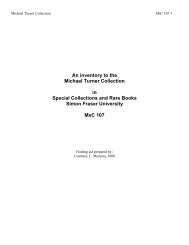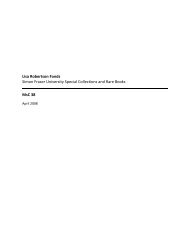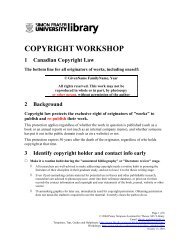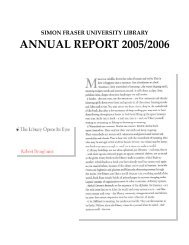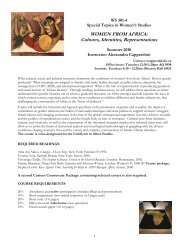scholarly articles - SFU Library - Simon Fraser University
scholarly articles - SFU Library - Simon Fraser University
scholarly articles - SFU Library - Simon Fraser University
You also want an ePaper? Increase the reach of your titles
YUMPU automatically turns print PDFs into web optimized ePapers that Google loves.
IAT 103W<br />
SUMMER 2012<br />
1<br />
Shane Plante<br />
SIAT Librarian<br />
<strong>Simon</strong> <strong>Fraser</strong> <strong>University</strong>
TODAY’S CLASS<br />
Evaluating Sources<br />
Finding background information<br />
Finding <strong>articles</strong><br />
APA citation style<br />
Where is help<br />
2
IAT 103W RESEARCH GUIDE<br />
The library’s homepage:<br />
www.lib.sfu.ca<br />
Click on “Browse Research<br />
Guides”<br />
3
IAT 103W RESEARCH GUIDE<br />
Click on Interactive<br />
Arts and then pick IAT<br />
103W<br />
4
SCHOLARLY VS. POPULAR JOURNALS<br />
5
POPULAR PUBLICATIONS<br />
Informs or entertains<br />
Sells products<br />
Aimed at general public<br />
Written by writers<br />
(rarely subject experts)<br />
Brief <strong>articles</strong><br />
Simple, non-technical<br />
language<br />
Rarely cites sources
SCHOLARLY PUBLICATIONS<br />
Reports on original<br />
research<br />
Written by (and for)<br />
academics, researchers<br />
Longer <strong>articles</strong><br />
Technical language,<br />
jargon<br />
Always cites sources<br />
AKA: Academic,<br />
Peer-reviewed, Refereed
EVALUATING INTERNET SOURCES<br />
How many of you have published something (e.g., a blog<br />
post or a webpage) on the internet<br />
“Anyone in the world can write anything they want<br />
about any subject”: http://youtu.be/kFBDn5PiL00<br />
You need to evaluate every source you find on the<br />
internet before using it for an assignment<br />
The IAT 103W Research Guide includes a section on<br />
evaluating what you find on the web 8
DEVELOPING A RESEARCH QUESTION<br />
• What do you already know about your topic<br />
• What do you want to know or find out<br />
▫ Approach your topic as a question to be answered.<br />
▫ Directs your research and gives it an appropriate<br />
(and manageable!) scope.<br />
• For today’s class, we will focus on the question:<br />
“Does playing videogames cause children to<br />
become more violent” 9
DEFINING CONCEPTS & BRAINSTORMING KEYWORDS<br />
On your handout, circle the key concepts in this<br />
research question.<br />
Does playing video games cause children to become<br />
more violent<br />
What might be some synonyms<br />
for these concept terms<br />
Broader concepts<br />
More specific<br />
10
(PRE)SEARCHING WITH BACKGROUND MATERIAL<br />
What is it<br />
• Encyclopedias and other reference sources, which give topic<br />
overviews and hint at sub-topics<br />
Why use it<br />
• Reading background materials prepares you to find other<br />
sources<br />
Helps you narrow a topic that is too big<br />
Helps you identify terminology used in the field<br />
Helps you identify key researchers<br />
Helps you find related readings<br />
Where to find it<br />
• Online Reference Sources<br />
11
ONLINE REFERENCE SOURCES<br />
12
WHERE TO SEARCH…<br />
Catalogue<br />
Fast<br />
Search<br />
<strong>Library</strong><br />
Search<br />
Databases<br />
Google<br />
Scholar
STARTING YOUR SEARCH: GOOGLE<br />
14
SEARCHING FOR JOURNAL ARTICLES<br />
To find journal <strong>articles</strong> you can search:<br />
• Fast Search<br />
• Google Scholar<br />
• Databases by Subject<br />
If the full-text for an article is not in a database, use the<br />
“Where Can I Get This” link (request item if necessary)<br />
15
GOOGLE SCHOLAR<br />
Results are relevance ranked<br />
Remember to always<br />
access via the <strong>SFU</strong><br />
library website!<br />
<br />
No way to sort <strong>articles</strong>.<br />
<br />
Difficult to refine search.<br />
17
WHERE TO SEARCH…<br />
<strong>Library</strong><br />
Search<br />
Fast<br />
Search<br />
Catalogue
TRY <strong>SFU</strong>’S GOOGLE (KIND OF) – FAST SEARCH<br />
•Books<br />
•E-Books<br />
•Journal Articles<br />
•Newspaper Articles<br />
•Images<br />
•Maps<br />
•Slides<br />
•<strong>SFU</strong> theses/dissertations<br />
•Government documents<br />
•Sound recordings and music<br />
Better than Google for academic research—a good starting place.<br />
However, subject databases are often more<br />
Specific and are easier to control…<br />
19
DATABASES<br />
What is a database<br />
Why use a database<br />
• Have databases on specific topics<br />
Less content, but often more relevant<br />
• Better for advanced searching<br />
• Subject searching!<br />
Much more efficient than keyword searching
FINDING SCHOLARLY ARTICLES<br />
The IAT 103W Research Guide includes several of the<br />
top multidisciplinary and subject-specific resources<br />
for finding <strong>scholarly</strong> <strong>articles</strong>.<br />
Finding <strong>articles</strong>
FINDING DATABASES …<br />
22
FINDING DATABASES …<br />
Dropdown menu with most<br />
subject areas
FINDING DATABASES …<br />
24
SAMPLE DATABASE: ACADEMIC SEARCH PREMIER<br />
25
USING DATABASES …
‘WHERE CAN I GET THIS’ LINKS<br />
Full-text article
FINDING JOURNAL ARTICLES<br />
Look in the database Academic Search Premier for<br />
<strong>scholarly</strong> <strong>articles</strong> on our sample topic:<br />
Does playing videogames cause children to become<br />
more violent<br />
Things to keep in mind:<br />
• Citation information<br />
• How can you get the article<br />
• Is it <strong>scholarly</strong><br />
28
THE RESEARCH PROCESS: A SUMMARY<br />
Plan your search<br />
• Identify keywords<br />
Think of synonyms<br />
Choose a database<br />
•Refine your search<br />
◦Get the article<br />
29
WRITING AND AVOIDING PLAGIARISM<br />
If you don’t know how to correctly cite a document, feel free<br />
to ask a librarian for help.<br />
If you want help with writing/structuring your paper or<br />
quoting/paraphrasing documents, see the Student Learning<br />
Commons.<br />
Workshops<br />
One-to-one appointments<br />
Drop-in consultations<br />
Handouts<br />
30
WRITING AND CITING IN APA FORMAT<br />
31
WRITING AND CITING IN APA FORMAT<br />
32
NEED HELP<br />
The library provides many ways to get help:<br />
• In-person at the reference desk<br />
• Telephone<br />
• Email<br />
• Instant<br />
• Text message<br />
• Student Learning Commons<br />
Note: <strong>Fraser</strong> <strong>Library</strong> at <strong>SFU</strong> Surrey is closed on Sat + Sun<br />
during the summer. You can still get help from librarians<br />
on these days, though.<br />
33


